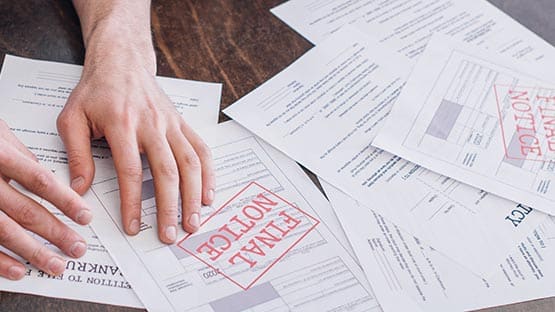
As 2023 prepares to end and a new year will begin, Americans are still struggling with inflation, unemployment, life after a pandemic and natural disasters.
According to WalletHub, 6.8 million American have at least one credit account on which they are late making payments or have been permitted to delay making payments on.
WalletHub compared the 50 states and Washington, D.C. across nine key metrics. Data includes average credit score, the change in the number of bankruptcy filings in the past year, and the share of individuals with accounts in distress. The personal finance website defines an account in distress as one that is in forbearance or has its payments deferred, so the account holder is temporarily allowed to not make payments because of financial struggle. WalletHub found that Americans are most struggling in Louisiana, Mississippi, Texas, Tennessee and Nevada.
“Louisiana is the state where people are in the most financial distress, due to factors like its high poverty rate and vulnerability to natural disasters, on top of all the other economic difficulties everyone has faced in the past few years like the COVID-19 pandemic and inflation,” said Cassandra Happe, WalletHub analyst. “Nearly 12 percent of Louisianans have a credit account that is either in forbearance or has its payments deferred, the largest percentage in the U.S. That ultimately leads to credit score damage, and the average credit score in Louisiana is already the third-lowest in the country at 642.”
Each state has its own challenges, according to WalletHub’s report. For example, Mississippi has the highest poverty rate, but the lowest average credit score in the U.S. One of the biggest increases in non-business bankruptcies in the past year is in Texas, although the state has the world’s 8th largest economy.
The second largest share of residents with accounts in forbearance or with deferred payments is in Tennessee at 10.2 percent, and Nevada has 8.4 percent of residents in the same situation.
“Financial distress can be a vicious cycle. People who can’t make payments on their accounts end up damaging their credit scores, which in turn makes it more difficult for them to qualify for the best solutions to their debt,” Happe said. “If you are in financial distress, some of the best options to pursue are debt settlement, debt management and free credit counseling. If your credit score hasn’t been damaged too much yet, you may be able to save a lot of money through debt consolidation.”
WalletHub offered tips for Americans in financial distress:
- Consider Hardship Programs: If your financial difficulties are temporary, you can ask your creditors about their “hardship programs,” which allow you to temporarily defer or reduce your monthly payments until you get back on your feet.
- Try Debt Management: Debt management involves negotiating permanently better terms with your credit card issuer, such as lower monthly payments or a lower interest rate. Creditors want to get paid on time, so if you show a willingness to pay what you owe but express that you need a bit of relief to do so, you may be successful. You should avoid paying a debt management company, though, as you can set up a plan directly with your lender.
- Avoid Easy Ways Out: You might be getting offers for various types of debt solutions, and it can be difficult to determine what’s legitimate and what’s not. A good rule of thumb is that if it seems too good to be true, it probably is. For example, debt settlement companies may promise to get you off the hook for pennies on the dollar, but they’ll also require you to default first and hurt your credit score further. They tend to charge expensive fees, too. You could propose a debt settlement offer to your lender directly, but most people in financial distress don’t have the money saved for a lump-sum payment.
- Consolidate Your Debt: A debt consolidation loan can put all your debts in one place with a lower interest rate. Another similar option is a balance transfer credit card. In both cases, though, you’ll typically need good or excellent credit to qualify for any decent options. You can qualify for a debt consolidation loan with lower credit scores, even bad credit, in some cases, but you won’t necessarily get an interest rate lower than the ones on your existing debts.
- Avoid Predatory Lenders: It may be tempting to get quick, almost-guaranteed cash from a payday lender or auto title lender. But if you do, you’ll be slapped with exorbitant interest rates and fees that will make paying back the money a nightmare.
- Budget Carefully: One way to have more money to pay your debts each month is to be stricter about your spending. Cut out any luxury purchases that you can, try to find better deals on your essential purchases, and put as much extra as you can toward paying your debts. In most cases, anything you pay over the minimum will help pay down the principal balance, rather than just interest, which helps you get out of debt more quickly.










